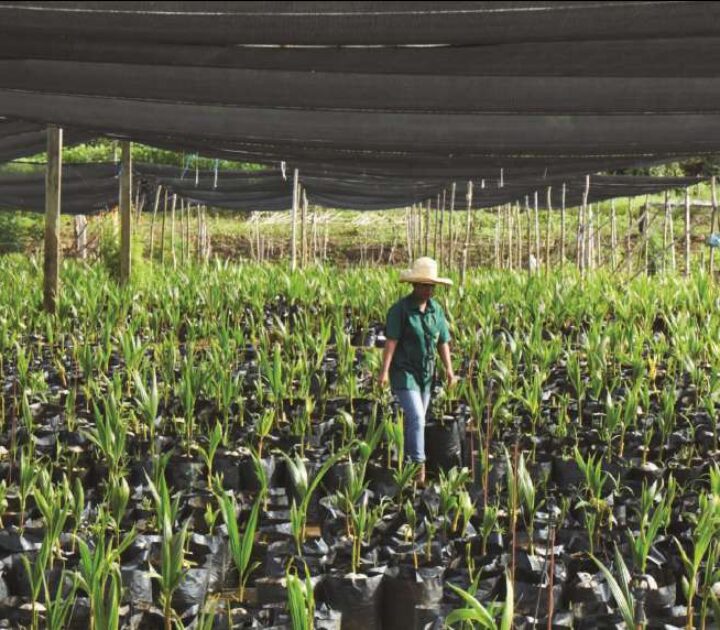
How reskilling can soften the economic blow of COVID-19
COVID-19 has raised enormous challenges, particularly in terms of redeploying labour to sectors like healthcare and, to differing degrees, education and online retailing.
While retraining is usually complex and time consuming, a unique experiment in Sweden suggests that, in special circumstances, speedier solutions are possible – with potentially far-reaching consequences for training long after the epidemic is over.
A consortium of Swedish private companies and public sector organizations implemented solutions in just weeks. Oscar Stege Unger, a board member at Scandinavian Airlines (SAS), part of the consortium, explained the lead up:
“We had an extraordinary board meeting on March 14th and decided to temporarily lay off 90% of cabin staff – a huge decision. We realized we would have a large group of people doing close to nothing, and, at the same time, an enormous need in our healthcare systems. As I’d worked with re-skilling before, I thought we could establish a short training program that would prepare them to support nurses and doctors, freeing them up to attend to the most important matters.”
Stege Unger contacted Fredrik Hillelson, CEO at Novare Human Capital, an HR and search company, who then reached out to Johanna Adami, President of Sophiahemmet University, a nursing school in Stockholm.
The three-and-a-half-day training program for assistant nurses they designed was offered to about 1,100 SAS cabin staff who had previously undergone basic medical training and had experience dealing with people in difficult situations.
Hundreds applied. Thirty were selected for the pilot, just two weeks after being laid off. Since then, 300 further attendants and people with equivalent training from other sectors have been primed for healthcare.
The three-day course followed the same curriculum for training assistant nurses, with initial priority given to SAS hourly employees seen as being in greatest need of reskilling. Later, selection resembled that for normal jobs, with a hiring manager defining requirements, applications and selection.
The positive results prompted extending the project to nursing homes to train another 200 laid-off staff from other companies. Quickly, it became evident Sweden’s needs stretched beyond healthcare, most schools had stayed open, but were struggling with high staff absenteeism. So retraining was extended to schooling.
To date, 60 people from different employers have undergone a three-day fast-track course covering lesson planning, high-level pedagogy and everyday classroom situations. All are now working as administrative support staff in Stockholm schools, allowing overstretched teachers to focus on core tasks.
The schools training was aimed at building basic skills so participants could support teachers, allowing the latter to focus on teaching. Tasks included making early morning classroom preparations, facilitating group work, answering basic questions and the like.
In a further extension, the scheme has been expanded to the forest products sector, involving tasks such as land clearance, planting and tree care.
No special financial or career inducements were required. The attraction was to help and make a difference (notably in healthcare) as well as perhaps the prospect of more stable longer-term employment.
The initiative has turned into a scheme that might last beyond COVID. Just two months after the pilot, rapid re-skilling has become a “standard” offering at Sophiahemmet University.
It has also provided valuable lessons. Primarily, it has highlighted the power of purpose: everyone involved mentioned that a unifying spirit made it possible to move forward rapidly and often unconventionally.
Johanna Adami said: “I have learned the importance of a shared and higher purpose if you want to make something like this happen. In reaching out to other organizations, politicians, and unions, you stand no chance unless you reach for the same thing.”
Sweden’s ecosystem was a second enabler. The complex and overarching nature of the initiative meant that no individual company, industry, or government sector could manage alone. Success required personal bonds and trust between people across society. As Stege Unger notes: “Sweden is built on the notion that we are most successful if we cooperate across; corporations, the public sector, academia, and not least politicians.”
“Sweden benefits from a culture of cooperation across sectors, grounded in its decades-old pact between business and labour. Being relatively small also helps to create eco-systems.”
And Swedes tend to be less hierarchical than many Europeans, making it easier to “reach out”.
The sense of urgency was essential to drive fast innovation. Such pressure made it possible to overcome red-tape, stringent labor regulations and limiting mindsets that might have impeded such bold initiatives.
As Hillelson emphasized: “Our Swedish system can be very slow, and different interests from authorities, unions, and companies sometimes keep us from acting at all, or acting fast enough. With this unique situation, I hoped things might be different this time. And they were. What helped us was to pilot quickly. Rather than going broad at once, we started small, and showed that it [the re-skilling] could work.”
Further potential?
Typically, re-skilling is seen as lengthy, with extensive selection, training and certification.
Even in the Swedish case, requirements had to be met — albeit much more rapidly. Needs had to be identified, as did the categories of workers available and their skills. It was also necessary to determine which specific skills were essential and could be taught fast since severe time constraints meant that the re-skilling could not address all parts of a typical training course.
On top of this, re-skilled workers had to be allocated to their new jobs and be ensured that quality standards were met and controlled.
Frederik Hillelson emphasized the critical importance of the companies involved:
“It was easy to get hospitals to hire SAS employees. They have a good reputation, not only because they have some prior medical training and extensive experience from working with people under difficult conditions, but simply because SAS is a strong employer brand.”
Finally, ramping up re-skilling and creating proof of concept needed financial support to train the initial workers and facilitate match-making. Funding would have been tricky with organizations struggling during the crisis. Fortunately, the Wallenberg Foundation provided seed finance for retraining and placing the first workers.
Once the tangible benefits became clear, hospitals and schools started picking up the tab.
We believe the scheme revealed significant development potential. Industries will have to shift their capabilities to become more digital, impacting both blue and white-collar workers. And schools are crying out for teachers in maths and technical subjects.
It should be possible to use the Swedish experience to develop a “template” applicable on much broader scale.
Read more about IMD’s research into reskilling published in the latest edition of Harvard Business Review here.
Research Information & Knowledge Hub for additional information on IMD publications

in Harvard Business Review May-June 2024, vol. 102, issue 3



Research Information & Knowledge Hub for additional information on IMD publications
Research Information & Knowledge Hub for additional information on IMD publications
Research Information & Knowledge Hub for additional information on IMD publications
Research Information & Knowledge Hub for additional information on IMD publications
in Harvard Business Review May-June 2024, vol. 102, issue 3
Research Information & Knowledge Hub for additional information on IMD publications
Research Information & Knowledge Hub for additional information on IMD publications
Research Information & Knowledge Hub for additional information on IMD publications
Research Information & Knowledge Hub for additional information on IMD publications
Research Information & Knowledge Hub for additional information on IMD publications
Case reference: IMD-7-2282 ©2022
Research Information & Knowledge Hub for additional information on IMD publications